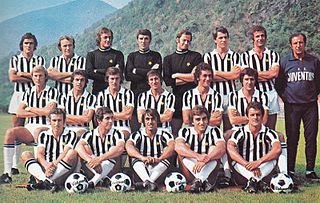Related Research Articles

Pasquale Foggia is an Italian football manager and former player, who played as a left winger or attacking midfielder. A quick and creative player, he was predominantly known for his dribbling skills and his ability to create chances for teammates.

In association football, the rabona is the technique of kicking the football where the kicking leg is crossed behind the back of the standing leg.
Marco Giampaolo is an Italian football manager and former professional player who played as a midfielder. He is the currently manager of Serie A club Lecce.
During the 1991–92 Serie A, under the guidance of Fabio Capello, Milan completed a remarkable unbeaten season, a run that eventually totalled 58 games. They finished eight points ahead of Serie A runners-up Juventus. However, it was a disappointing season for Internazionale, who could only manage an eighth-place finish, meaning that 1992–93 would bring no European action for them — something which had been a rare occurrence over the last three decades. Defending champions Sampdoria finished sixth and their last chance of European action for the following season was lost when they were beaten by the Spanish champions Barcelona in the final of the European Cup. Bari, Hellas Verona, Cremonese and Ascoli were all relegated.
S.S. Lazio finished in fifth in Serie A and reached the quarter-final in the Coppa Italia. Prior to the season had Lazio with new Chairman Sergio Cragnotti made three important signings, with Paul Gascoigne, Giuseppe Signori and Aron Winter all joining the club.
Associazione Calcio Fiorentina failed to take off under former Brazil national team coach Sebastião Lazaroni, and ended the season in 12th place. The result prompted president Cecchi Gori to sign German star Stefan Effenberg among others for the coming season, also replacing Lazaroni with Luigi Radice. The most significant event in Fiorentina's season was the arrival of Argentine striker Gabriel Batistuta, who was to become Fiorentina's all-time top scorer during his nine years at the club.
In the 1984–1985 season, Torino Calcio competed in Serie A.
Nicola Bellomo is an Italian professional footballer who plays for Serie B club Bari.

S.S.C. Napoli won its first Serie A title with recently crowned World Cup winner Diego Maradona as their most influential player. Central defender Ciro Ferrara got his breakthrough, helping out the team to win the trophy. The two new signings Andrea Carnevale and Fernando De Napoli also proved crucial in the title-winning campaign, which sparked off fanatical celebrations in Naples.
A.S. Roma returned to prominence with a 3rd place in Serie A under returning coach Nils Liedholm. With new signings such as Rudi Völler and Lionello Manfredonia, Roma was able to qualify for international football once again, with playmaker Giuseppe Giannini arguably playing at his very peak, setting a career record 11 league goals from attacking midfield.
Michele Rigione is an Italian footballer who plays for Serie C Group C side Avellino as a centre back.

Salvatore Andrea Molina is an Italian professional footballer who plays as a midfielder or winger for Serie B club Südtirol.
Cosimo Chiricò is an Italian professional footballer who plays as a winger or attacking midfielder for Serie C Group C club Catania.
This is a list of the major football derbies in Italy.
The 2015–16 Serie B was the 84th season since its establishment in 1929. A total of 22 teams contested the league: 16 returning from the 2014–15 season, 4 promoted from Lega Pro, and 2 relegated from Serie A. Vacancies created by the bankruptcy of Serie A-relegated Parma and the demotion of Catania to Lega Pro due to match fixing allowed Brescia to remain in the league despite being relegated. Furthermore, Teramo was due to participate to Serie B but due to the allegations for match-fixing, the Courts decided to relegate Teramo in the last place of Lega Pro of the previous season. After the demotion of Catania, Virtus Entella was readmitted into Serie B as the best team of the relegated teams from the previous season. Furthermore, Ascoli was promoted into the championship after finishing second in Lega Pro Group B, second after Teramo before being stripped of the title for the match-fixing scandal.
The 2017–18 season was Unione Sportiva Città di Palermo's 1st season in Serie B, the second-highest division of Italian football, after relegation from Serie A by the end of the 2016-17 season.

During 1974–75 season Juventus competed in Serie A, Coppa Italia and UEFA Cup.
During the 1975–76 season, Juventus competed in Serie A, the Coppa Italia, and the European Cup.

During the 1973–74 season Juventus competed in Serie A, Coppa Italia, Intercontinental Cup and European Cup.
During the 1982–83 season Football Club Internazionale Milano competed in Serie A, Coppa Italia and UEFA Cup Winners' Cup.
References
- 1 2 3 Sebastiano Vernazza (12 February 2016). "GIOVANNI ROCCOTELLI: IL PIONIERE DELLA RABONA" (in Italian). Storie di Calcio. Retrieved 22 December 2016.
- 1 2 Sebastiano Vernazza (2 February 2007). "Cocò Roccotelli, il mago della rabona" [Cocò Roccotelli, the rabona wizard] (in Italian). La Gazzetta dello Sport. Retrieved 22 December 2016.
- ↑ Steinberg, Jacob (10 October 2014). "The Joy of Six: rabonas". Guardian. Retrieved 19 March 2020.
- ↑ "Giovanni Roccotelli" Archived 28 September 2007 at the Wayback Machine (in Italian)
- ↑ "Cocò, l'acrobata del numero 7" Archived 19 February 2009 at the Wayback Machine (in Italian)
- ↑ Paul Doyle (18 November 2009). "Which teams have played in their top five domestic tiers in this decade?". The Guardian. Retrieved 18 November 2009.
- ↑ "Roccotelli: "A Caserta anno bellissimo ma col Foggia Calcio è sempre il mio derby"" (in Italian). FoggiaSport24.com. 6 April 2016. Retrieved 24 February 2017.
